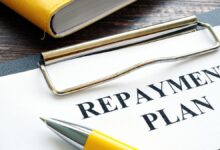
When Does the Bankruptcy Process End? Bankruptcy Property Regime
Table of Contents
By discontinuing the proceedings
Insolvency proceedings are always opened at the request of the debtor or one of his creditors if there is a reason for bankruptcy. After the opening of the insolvency proceedings, it is the task of the insolvency administrator to draw the attachable debtor assets to the bankruptcy estate. If it becomes apparent that there are not even enough assets to cover the procedural costs, the bankruptcy proceedings will be discontinued by the bankruptcy court. This means that the insolvency procedure ends before it has even really started. This situation is regulated in § 207 and is called mass poverty.
By withdrawing the application to open
The bankruptcy procedure can also be terminated by a declaration. However, this is only possible in the early stages of the procedure. If you, as a debtor, have filed an application to open insolvency proceedings, the bankruptcy court will check whether the application meets the requirements. This can take a while. At this stage, however, you can still declare to the bankruptcy attorney that you want to withdraw the opening application. As long as the bankruptcy court has not passed a resolution to open bankruptcy proceedings on your assets, you can withdraw the original application.
The reasons for the withdrawal of the application can be of different nature: an unexpected windfall or preventive measure against a refusal application.
By repealing the procedure
The insolvency procedure can be understood as such in the broader and narrower sense. When insolvency proceedings are mentioned, the entire process is usually meant, i.e. from the opening to the discharge of the remaining debt. This can be more precisely referred to as insolvency proceedings in the broader sense. However, the insolvency procedure in the narrower sense is much shorter and usually takes about a year. It extends from the opening of insolvency proceedings to the final date. The so-called final distribution to the creditors takes place, after which the bankruptcy court cancels the insolvency proceedings in the narrower sense. This is followed by an approximately two-year period of good conduct, at the end of which the remaining debt is discharged.
By granting the remaining debt discharge
In any case, with the final discharge of the remaining debt, the procedure ends completely. This usually takes place after the conduct of business period, which in turn follows the insolvency proceedings in the narrower sense (cf. the previous section). The debtor must also request the payment of the remaining debts, otherwise there will be no release from the remaining debts. It still happens that debtors who initiate their own proceedings forget to apply for the discharge of residual debt. Other errors in the application can later cost the discharge of the remaining debt, such as incomplete information about the creditors!
So that you can go through your bankruptcy proceedings with a clear conscience, entrust us with the preparation of the bankruptcy proceedings. Our specialist lawyers for insolvency law have specialized in this for years and can provide you with individual advice. The team at Attorney Debt Fighters, a law firm, is happy to help you with safe best debt relief solutions.
Insolvency in the community property regime – what happens then?
Is the collective property attached in the property regime of the community of property?
The property regime of the community of property is not the rule that the law provides for marriage. This article aims to answer the question of which assets of the spouses can be seized in the event of bankruptcy proceedings.
In the first step, we will explain to you what the property regime of the community of property exactly means and which assets the law differentiates. In the second part we explain to you which parts of the married couple’s assets are attachable and non-attachable.
What is the property regime of the community of property?
The community of property is one of three possible property regimes that married couples can agree on. The legal consequences of the community of property are largely regulated in §§ 1415 ff. BGB, from which the spouses may, however, deviate.

If the spouses do not agree anything special at the time of the marriage, the property regime of the community of gains applies. In our own article, we explain the consequences that affect the non-insolvent spouse. What happens to the spouse in bankruptcy?
Which assets are distinguished?
What is a common good?
The common property is the property that both spouses are entitled to jointly. Whole parts of such property belong to each spouse. One also speaks of total hand strength. No one can dispose of individual items alone, only both spouses together. It is conceivable that an individual manages the common property or both spouses jointly (§ 1421).
What is a special good?
The special property includes assets of a single spouse that are not transferable by legal transaction, but can be managed independently by the respective spouse (§ 1417).
What is a reserved property?
The reserved property includes assets that, according to the agreement of both spouses, should remain with the respective spouse.
What becomes the bankruptcy estate?
In any case, the bankruptcy estate includes the special property and reserved property of the insolvent spouse. If the insolvent spouse manages the common property (which is the exceptional situation under the law), this also becomes part of the bankruptcy estate.
If the common property is managed jointly, i.e. by both spouses, then this does not fall into the bankruptcy estate. Should an asset be seized by the insolvency administrator, the non-insolvent spouse can request segregation in accordance with Section 47. What that means exactly is explained in our article Right of segregation and segregation in bankruptcy.
If you want to get out of your debt, we will be happy to advise you on the best way for you. Marriage debt, in particular, can raise difficult questions that we’d be happy to help you with. We have specialized in debt relief for clients for years. A debt settlement or an insolvency procedure can help you to start over financially in a short time. We would be happy to advise you on this in our free initial consultation on the phone (727) 538-4188.
Do you have a general question on “When does the bankruptcy process end? “? Get in touch with us right away at attorneydebtfighters.com.








